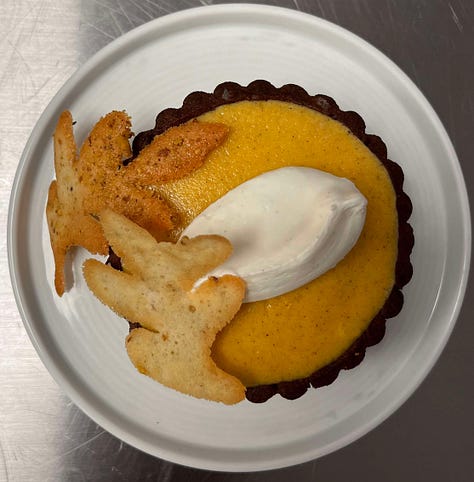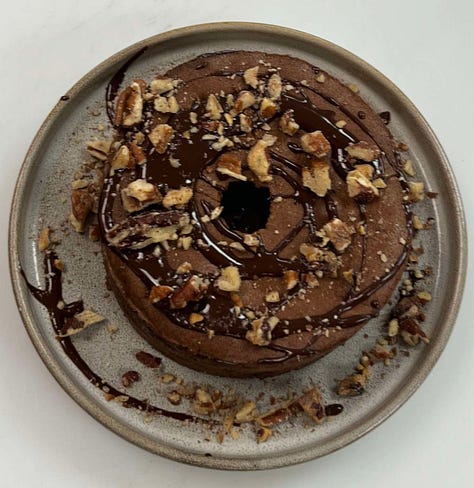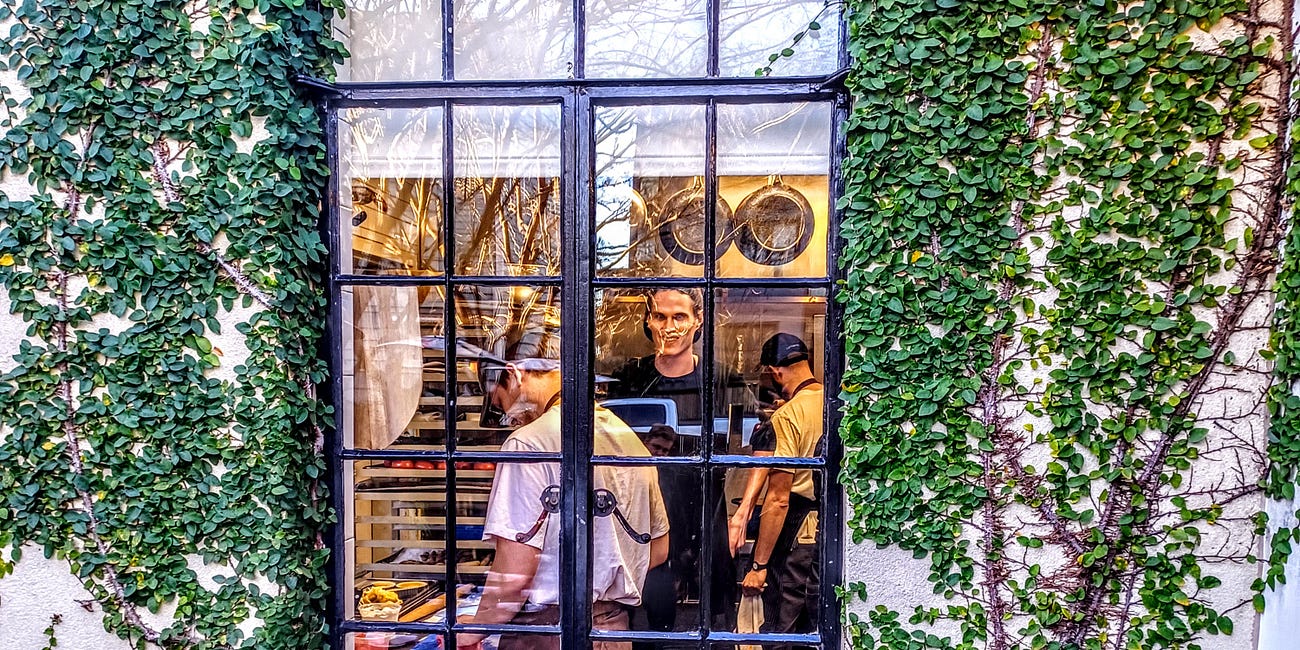My son Alex, 27, has a new job as a pastry chef at a senior living community. He has always had an artistic bent and he views the preparation of food as a form of artistic expression as well as culture.
He frequently makes exotic desserts and asks extended family members for feedback. His latest concoction was croquembouche, which translates as “crunches in the mouth.” It consists of choux pastry puffs piled into a cone and bound with threads of caramel. He made it for Thanksgiving.
As he exclaimed in the video, he stacked puffed pastries on top of each other and then coated them with caramel. Apple Zabaione served as the base. That’s like a wine custard, but Alex used apple whiskey instead of wine and added sugar. On top, he added a mixture of lemon curd.
In Italy and France, croquembouche is often served at weddings, baptisms, and First Communions.
His other recent creations include:



Left to right: 1. Orange cranberry upside-down cake with Cointreau liqueur cream. 2. Butternut squash cheesecake chocolate tart with vanilla sour cream and a pistachio brown butter tuile. 3. Warm turtle brownie cake filled with salted caramel and topped with chocolate ganache and pecans.
This got me thinking about how, since the late 20th century, Americans have started to become foodies. I certainly did not grow up as one, and Alex was not brought up as one. His mother has always enjoyed experimenting in the kitchen and he picked up some of that interest from her. Living overseas — in Turkey and the United Arab Emirates — and traveling cheaply to about 20 countries during his formative teen years made him aware of differing food cultures worldwide. He was exposed to a lot of different cuisines and learned to love Turkish, Arabic, and Indian food.
I used to complain when he was a child that he was a very picky eater, but it turns out he has a refined sense of taste and has smartly taken that talent and made a career out of it.
Cooking started to become a vocation for him in college, as he took on kitchen jobs to help finance his education. He majored in outdoor education but food preparation has become his first professional love.
I shared the following article with him, and he had a lot of thoughts about it, both positive and negative. What do you think of it?
Has Food Replaced Art As High Culture?
William Deresiewicz, an essayist, critic, and author, in the NYT, observed in 2012 that Americans, like the French and Italians of earlier generations, have discovered “their senses — learning to value pleasure, distinguish subtle differences, and make fine judgments — and sensual responsiveness is the basis of artistic sensibility. Maybe we were finally on our way to Old World sophistication,” similar to the French and Italians who have long had very sophisticated tastes in food.
Americans now seem to believe that food exquisitely prepared to give an elevated taste offers insight into other people. Quality food improbably may “allow you to see the world in a new way, or force you to take an inventory of your soul…
“Foodism has taken on the sociological characteristics of what used to be known — in the days of the rising postwar middle class, when Mortimer Adler was peddling the Great Books and Leonard Bernstein was on television — as culture. It is costly. It requires knowledge and connoisseurship, which are themselves costly to develop. It is a badge of membership in the higher classes, an ideal example of what Thorstein Veblen, the great social critic of the Gilded Age, called conspicuous consumption. It is a vehicle of status aspiration and competition, an ever-present occasion for snobbery, one-upmanship and social aggression. (My farmers’ market has bigger, better, fresher tomatoes than yours.) Nobody cares if you know about Mozart or Leonardo anymore, but you had better be able to discuss the difference between ganache and couverture….
“Food, for young people now, is creativity, commerce, politics, health, almost religion…Like art, food is also a genuine passion that people like to share with their friends. Many try their hands at it as amateurs — the weekend chef is what the Sunday painter used to be — while avowing their respect for the professionals and their veneration for the geniuses. It has developed, of late, an elaborate cultural apparatus that parallels the one that exists for art, a whole literature of criticism, journalism, appreciation, memoir, and theoretical debate. It has its awards, its maestros, its televised performances. It has become a matter of local and national pride, while maintaining, as culture did in the old days, a sense of deference toward the European centers and traditions — enriched at a later stage, in both cases, by a globally minded eclecticism.
“Food now expresses the symbolic values and absorbs the spiritual energies of the educated class. It has become invested with the meaning of life. It is seen as the path to salvation, for the self and humanity both.
“But food, for all that, is not art. Both begin by addressing the senses, but that is where food stops. It is not narrative or representational, does not organize and express emotion. An apple is not a story, even if we can tell a story about it. A curry is not an idea, even if its creation is the result of one. Meals can evoke emotions, but only very roughly and generally, and only within a very limited range — comfort, delight, perhaps nostalgia, but not anger, say, or sorrow, or a thousand other things. Food is highly developed as a system of sensations, extremely crude as a system of symbols.
Read the full article in the NYT, 2012. Free link.
Related:
From Palate to Palette: Can Food Be Art? Do chefs, farmers & food artisans deserve a place at the table with painters, photographers, and performers?
Alex will give his thoughts on these articles soon. What do you think?
Previous:
Aspiring Chef Interview
International food critic Alan Richman writes that Chez Nous in Charleston, SC may be “one of the best small restaurants in America.” I agree, and it has nothing to do with the fact my son works there. ;-) Richman might know what he is talking about since he is a winner of
What If A Presidential Candidate Dies Before Jan. 20, Or Before Election Is Certified on Jan. 6?
It happened before, in 1872. Presidential candidate and NY Herald Publisher Horace Greeley, born in 1811, died on November 29, 1872 at age 61, less than a month after losing the election to Ulysses S. Grant. Depressed both from his loss, a movement at the newspaper to oust him, and the recent passing of his wife, he was sent to an asylum. “Fame is a vap…










Share this post